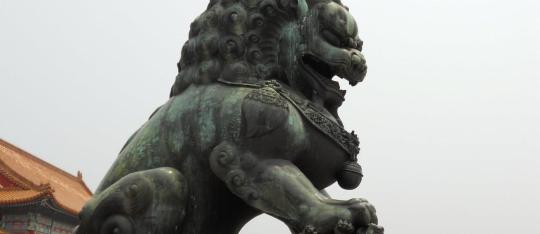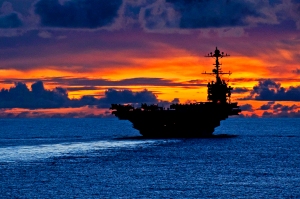Tagged: Rising China
The Dragon’s Navy – Chinese Capabilities and American Policy
As China’s military capabilities grow, it is inevitable that it will use its new found power to its advantage. To maintain regionally stability the United States must remain the dominant naval power in the Western Pacific. But America must also be willing to act within the rules.
Currently America remains the dominant naval power in the Western Pacific. Should China’s navy gain the upper hand, Beijing could act unilaterally to influence other regional players. Most of the world’s trade is done through shipping, and the economies of many if not all of the countries in the region heavily depend on the Pacific sea-lanes. This leaves China’s neighbors vulnerable to coercive action. Naval dominance would allow China to isolate and possibly annex the island nation of Taiwan. The fact that Japan – one of China’s main rivals in the region – is also surrounded by ocean means it too is vulnerable to Chinese force. Although the nations of South-East Asia are connected to the mainland, this does not negate the vital strategic importance of the South China Sea. If China is allowed to dominate to Western Pacific, it could essentially ‘seal-off’ the region, leaving other nations alone with the dragon.
 The Bad News
The Bad News
Although it will be a long time until China can rival the American military’s global dominance, it is very possible that China could rival US power in the Western Pacific in the not-to-distant future. The first piece of bad news is that the People’s Liberation Army (PLA) is currently developing a navy that can do just that. The Pentagon has recognized China now possesses “the most active land-based ballistic and cruise missile program in the world.” The PLA is currently developing the world’s first anti-ship ballistic missile. China’s submarine fleet is also enjoying a major modernizing overhaul. Furthermore the PLA is actively developing new technologies such as anti-satellite and cyber-war capabilities. In 2007 China made a spectacle of shooting down its own broken weather satellite. In the event of a Chinese-American conflict, these new capabilities could be used to attack American naval intelligence and communication, meaning America would have to ‘fight-blind.’ Essentially China is developing what military jargon calls A2/AD (anti-access/area denial) capabilities, meaning the PLA could threaten US aircraft carrier groups and/or bases in Okinawa, South Korea, or even Guam. The end goal for China would be to deny the American navy access to the strategically-important Western Pacific region.
The second piece of bad news comes from history. Henry Kissinger has pointed out that neither Washington nor Beijing has had much experience dealing with equals in a peaceful manner. Chinese nationalism adds a degree of uncertainty to the situation. The Chinese administration, and more importantly its people have a very real sense of past greatness, recent humiliation, and future opportunity. The fifteenth century Ming Dynasty was truly a global power in its time. However, at the beginning of the 20th century, China was essentially a massive failed-state. It has a memory of being ‘carved-up’ by imperial actors, and now craves the respect and power it believe it deserves.

China’s ‘recent-humiliation’ – a 1901 British political cartoon depicts China as a dragon being ‘carved up’ by the imperial powers in the wake of the Boxer Rebellion
Kaplan uses examples of Chinese naval vessels provocatively harassing American ships to argue China is not yet a great power, but still a rising and immature power, “obsessed with the territorial humiliations it suffered in the nineteenth and twentieth centuries.” If China continues to act in this way a small confrontation can explode into a war simply because of Chinese nationalism. Taiwan is an example of how Chinese nationalism can present a problem. Where Washington believes it is protecting a semi-sovereign democracy, Beijing may believe America could be using the situation as an excuse to keep China’s power in check. Chinese nationalists may see this American policy as unfair, adding to a sense of entitlement to the situation. Essentially Chinese nationalism means China may assert its dominance in the region because it believes it deserves dominance. Thus, a small confrontation could lead to larger conflict, perhaps even war. It is not hard to draw a parallel from current US/China relations to pre-1914 British/German ones. Both modern China and 1914 Germany have nationalistic elements, and are/were attempting to assert power globally by developing a navy. Both the modern US and 1914 Britain feel/felt threatened by this assertion of power.
A critic of this argument could point to the inter-connectivity of the global economy – conflict would be a self-inflicted blow to ones own economic potential. Enter the final piece of bad news. In the anarchic realm of inter-state geopolitics, a state will not gain something without actively seeking it. Beijing and Robert Kagan, a foreign policy analyst, states: “Power changes nations . . . It expands their wants and desires, increases their sense of entitlement, their need for deference and respect. It also makes them more ambitious. It lessons their tolerance to obstacles, their willingness to take no for an answer.” Tokyo’s recent spat over the Senkaku/Diaoyu islands does not lend well to the theory that if left unchecked China would not exploit its advantages. Again the 1914 British/German example adds pessimism. Germany was Britain’s second largest export market, and Britain was Germany’s largest before the declared war on one another. Therefore there is no guarantee that China won’t sacrifice temporary economic growth for everlasting geopolitical gains.
The Good News
The good news is that the modern international state system is much different than the one that existed in 1914. Indeed today there exists a multitude of forums that allow for diplomacy rather than war. Organisations like the UN, the G20, the Nuclear Non-Proliferation Treaty, and the WTO can facilitate a rising China. Another main war-deterrent is the fact that both sides have nuclear weapons.
American Policy Going Forward
American policy must do three things to accommodate the emergence of China as a great power. First of all, American must maintain its presence in the Western Pacific. China would be invited to act unilaterally and aggressively in the region should the American navy ever avoid the Western Pacific to avoid the risk of a Chinese assault. The Western Pacific sea lanes exist in international waters after all, and are vital to regional stability. Furthermore the Pentagon must address China’s new A2/AD capabilities by must investing in cyber-defense and advanced anti-ballistics. This would send a signal to China’s neighbors that Washington is there to counter the Chinese threat. Allowing China’s navy to act alone in the region would set a dangerous precedent. The hawks in Beijing could argue militarism worked in China’s favor and would push for more aggressive techniques. Speaking at the July 2010 ASEAN conference, Hilary Clinton guaranteed American intervention should China threaten safe passage for shipping. Actions like these must continue.
While America must counter China on the one hand, it must act within the confines of existing international law on the other. By breaking international law America send the message that great powers are allowed to ignore the rules. As China rises and becomes a great power it too will act in this way. Barack Obama’s The Audacity of Hope echoes this fact – “[w]hen the world’s sole superpower willingly restrains its power and abides by internationally agreed-upon standards of conduct, it sends a message that these rules are worth following.” However this policy must not end four years from now, it must become a central pillar of American foreign policy for several decades to accommodate China’s rise.
Thirdly, Washington and Beijing must hold talks disusing how each state will react should a crisis arise in the region. How should each react should Taiwan declare independence, or should a revolution occur in North Korea? Discussing potential policy would prevent each government from overreacting, and thus prevent unnecessary conflict. In 1914 the mere assassination of an Archduke triggered the most devastating war the world had yet seen; carefully planned actions by both sides throughout China’s rise will prove the pre-1914 analogy wrong.
Works Cited
“Could Asia really go to war over these?” The Economist vol. 404 no. 8803, 22 – 28 2012.
“The Dragon’s New Teeth.” The Economist vol. 403 no. 8779, 7 – 13 April 2012.
Friedber, Aaron L. “Busking Beijing.” Foreign Affairs vol. 91 no. 5, September/October 2012.
“Friend or Foe? A special report on China’s place in the world.” The Economist vol. 397 no. 8711, 4 December 2010.
Kaplan, Robert D. The Revenge of Geography. New York: Random House, 2012.
Nathan, Andrew J. and Andrew Scobell. “How China Sees America” Foreign Affairs vol. 91 no. 5, September/October 2012.
Obama, Barack. The Audacity of Hope. New York: Random House Inc., 2006.




